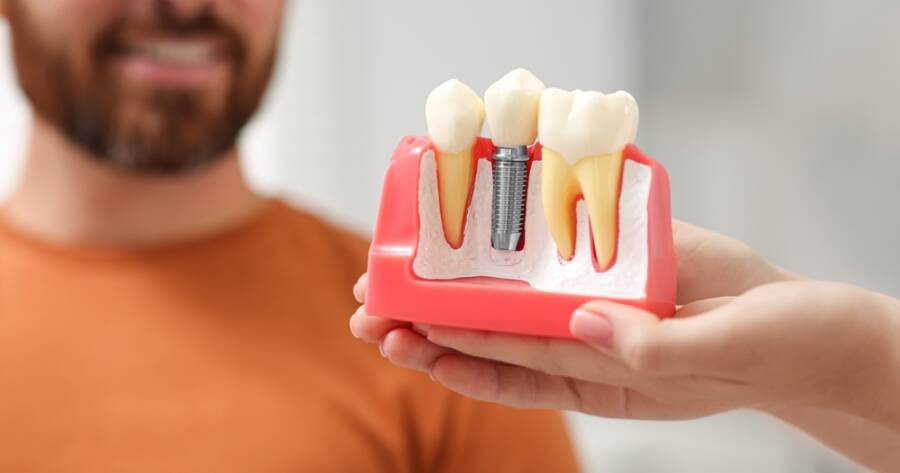When it comes to restoring missing teeth, dental implants offer a popular and highly effective solution. For those considering their options, dental implants may provide both cosmetic and health-related advantages. While results can vary depending on individual circumstances, this treatment option has the potential to significantly improve quality of life. Let’s explore some of the reasons dental implants could be worth considering and how they may enhance both your smile and overall well-being.
What Are Dental Implants?
Dental implants are a restorative dental treatment designed to replace missing teeth. They consist of three primary components:
- The implant post: A titanium screw or post that is surgically placed into the jawbone to act as an artificial tooth root.
- The abutment: A connector piece that attaches the implant post to the prosthetic tooth.
- The prosthetic tooth: A crown or denture that mimics the appearance and function of a natural tooth.
This structure aims to replicate the look, feel, and function of natural teeth. While the process can take several months and involves surgical procedures, the long-term potential benefits may outweigh the initial investment for many patients.
Improved Confidence and Aesthetic Benefits
One of the most immediate effects of dental implants is the potential improvement in self-confidence. Missing teeth can sometimes impact how individuals feel about their appearance, and implants may help address this concern. Dental implants are designed to blend seamlessly with natural teeth, offering a cohesive and natural look that might enhance your smile.
Additionally, implants are designed to be secure and stable, meaning you can eat, speak, and smile with greater ease. This sense of security can help you feel more confident in social or professional situations, reducing self-consciousness that may arise from gaps or removable dentures.
May Contribute to Better Oral Health
Dental implants may have a role in supporting long-term oral health. For example, unlike traditional dental bridges, which often require the alteration of adjacent healthy teeth, implants do not rely on neighboring teeth for support. This preservation of natural tooth structure could be advantageous for overall dental integrity.
Implants may also help stimulate the jawbone in a way that prevents some degree of bone loss. When a tooth is lost, the lack of stimulation in the jaw can lead to gradual bone deterioration. Implants mimic the function of natural tooth roots and may help to maintain bone density. However, individual outcomes can vary based on factors such as bone health, oral hygiene practices, and general health conditions.
Enhanced Functionality and Comfort
Unlike removable dentures, which can sometimes shift or cause discomfort, dental implants are anchored securely in the jawbone. This stability may allow for more natural chewing and speaking. Patients often report that implants feel similar to natural teeth, potentially making it easier to enjoy a wider variety of foods.
That said, it’s important to remember that proper care and maintenance are critical to the success of implants. Regular dental check-ups, good oral hygiene practices, and a healthy lifestyle all contribute to their functionality and comfort over time.
Potential Systemic Health Benefits
The benefits of dental implants may extend beyond oral health. For example:
- Nutritional health: Being able to chew effectively may support a balanced diet, enabling you to consume a wide range of nutritious foods. This could indirectly benefit overall health.
- Speech clarity: Missing teeth or poorly fitting dentures can sometimes impair speech. Dental implants may help restore clearer articulation.
- Psychological well-being: A healthy, functional smile can positively impact mental health, potentially boosting self-esteem and reducing social anxiety.
While these benefits are not guaranteed, they illustrate the possible holistic advantages of dental implants.
Considerations Before Choosing Dental Implants
While dental implants offer numerous potential benefits, they may not be suitable for everyone. Several factors can influence whether this treatment option is right for you, such as:
- Bone density: Adequate jawbone density is typically required to support the implant post. In some cases, bone grafting procedures may be necessary.
- Overall health: Conditions like uncontrolled diabetes or certain autoimmune disorders could affect healing and implant success rates.
- Commitment to maintenance: Implants require consistent care, including daily brushing, flossing, and regular dental visits.
Consulting with a qualified dental professional is essential to evaluate your unique circumstances and determine whether dental implants are a viable option for your needs.
Learn More Today!
Dental implants are a sophisticated solution that can potentially transform your smile and contribute to better oral and overall health. With their ability to provide aesthetic improvements, functional benefits, and possible health advantages, they offer a compelling option for those looking to replace missing teeth.
However, it is important to carefully consider your individual health and lifestyle factors, and consult with a trusted dental professional to determine if implants align with your goals. With proper care, dental implants have the potential to be a long-term investment in your well-being.



